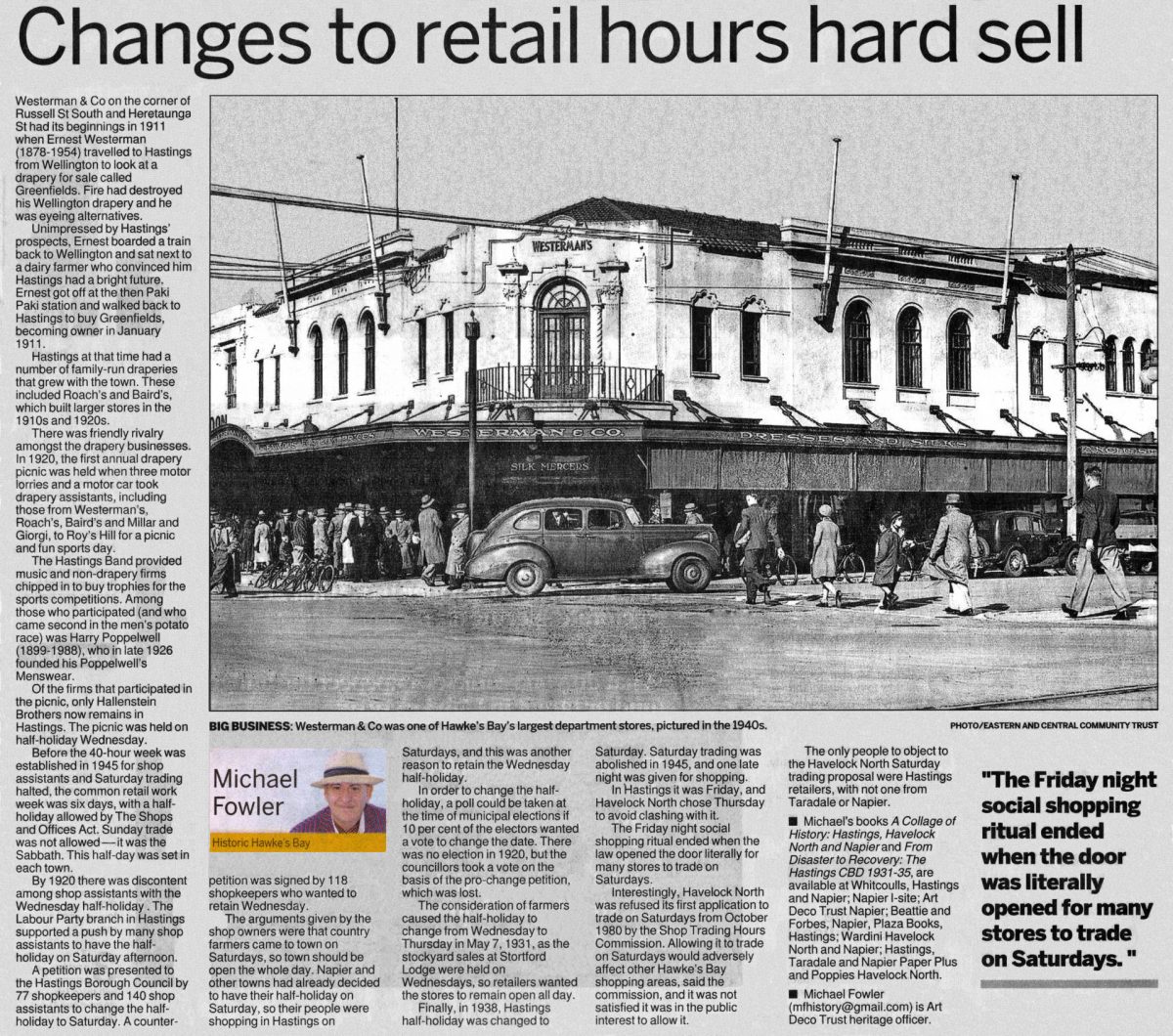Changes to retail hours hard sell
Michael Fowler
Historic Hawke’s Bay
Westerman & Co on the corner of Russell St South and Heretaunga St had its beginnings in 1911 when Ernest Westerman (1878-1954) travelled to Hastings from Wellington to look at a drapery for sale called Greenfields. Fire had destroyed his Wellington drapery and he was eyeing alternatives.
Unimpressed by Hastings’ prospects Ernest boarded a train back to Wellington and sat next to a dairy farmer who convinced him Hastings had a bright future. Ernest got off at the then Paki Paki [Pakipaki] station and walked back to Hastings to buy Greenfields, becoming the owner in January 1911.
Hastings at that time had a number of family-run draperies that grew with the town. These included Roach’s and Baird’s, which built larger stores in the 1910s and 1920s.
There was friendly rivalry amongst the drapery businesses. In 1920 the first annual drapery picnic was held when three motor lorries and a motor car took drapery assistants, including those from Westerman’s, Roach’s, Baird’s and Millar and Giorgi, to Roy’s Hill for a picnic and fun sports day.
The Hastings Band provided music and non-drapery firms chipped in to buy trophies for the sports competitions. Among those who participated (and who came second in the men’s potato race) was Harry Poppelwell (1899-1988) who in late 1926 founded his Poppelwell’s Menswear.
Of the firms that participated in the picnic, only Hallenstein Brothers now remains in Hastings. The picnic was held on half-holiday Wednesday.
Before the 40-hour week was established in 1945 for shop assistants and Saturday trading halted, the common retail work week was six day, with a half-holiday allowed by the Shops and Offices Act. Sunday trade was not allowed – it was the Sabbath. This half-day was set in each town.
By 1920 there was discontent among shop assistants with the Wednesday half-holiday. The Labour Party branch in Hastings supported a push by many shop assistants to have the half-holiday on Saturday afternoon.
A petition was presented to the Hastings Borough Council by 77 shopkeepers and 140 shop assistants to change the half-holiday to Saturday. A counter-petition was signed by 118 shopkeepers who wanted to retain Wednesday.
The arguments given by the shop owners were that country farmers came to town on Saturdays, so town should be open the whole day. Napier and other towns had already decided to have their half- holiday on Saturday, so their people were shopping in Hastings on Saturdays, and this was another reason to retain the Wednesday half-holiday.
In order to change the half-holiday, a poll could be taken at the time of municipal elections if 10 per cent of the electors wanted a vote to change the date. There was no election in 1920, but the councillors took a vote on the basis of the pro-change petition, which was lost.
The consideration of farmers caused the half-holiday to change from Wednesday to Thursday in May 7, 1931, as the stockyard sales at Stortford Lodge were held on Wednesdays, so retailers wanted the stores to remain open all day.
Finally, in 1938 Hastings half-holiday was changed to Saturday. Saturday trading was abolished in 1945, and one late night was given for shopping.
In Hastings it was Friday and Havelock North chose Thursday to avoid clashing with it.
The Friday night social shopping ritual ended when the law opened the door literally for many stores to trade on Saturdays.
Interestingly Havelock North was refused its first application to trade on Saturdays from October 1980 by the Shop Trading Hours Commission. Allowing it to trade on Saturdays would adversely affect other Hawke’s Bay shopping areas, said the commission, and it was not satisfied it was in the public interest to allow it.
The only people to object to the Havelock North Saturday trading proposal were Hastings retailers, with not one from Taradale or Napier.
Michael’s books A Collage of History: Hastings, Havelock North and Napier and From Disaster to Recovery: The Hastings CBD 1931-35 are available at Whitcoulls, Hastings and Napier; Napier I-site; Art Deco Trust Napier; Beattie and Forbes, Napier; Plaza Books, Hastings; Wardini Books Havelock North and Napier; Hastings, Taradale and Napier Paper Plus and Poppies Havelock North..
Michael Fowler ([email protected]) is Art Deco Trust heritage officer.
“The Friday night social shopping ritual ended when the door was literally opened for many stores to trade on Saturdays.”
Photo caption – BIG BUSINESS: Westerman & Co was one of Hawke’s Bay’s largest department stores, pictured in the 1940s. PHOTO/ EASTERN AND CENTRAL COMMUNITY TRUST












Do you know something about this record?
Please note we cannot verify the accuracy of any information posted by the community.